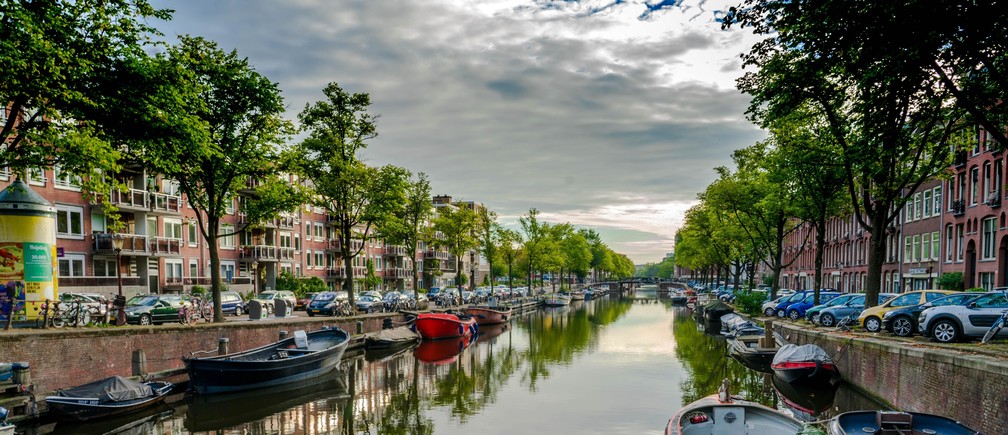- Doughnut plan seeks to balance the needs of people and the environment.
- Amsterdam aims to offer everyone fair social terms within safe ecological limits.
- The idea was conceived by Kate Raworth, an Oxford University economist.
- A shortfall of investment in climate action will be a key risk as the world emerges from COVID-19.
- But there’s also an opportunity to incorporate sustainability in future plans.
Progress on climate action and sustainability could be a significant casualty of the COVID-19 coronavirus crisis, according to a new report from the World Economic Forum.
COVID-19 Risks Outlook: A Preliminary Mapping and Its Implications warns that “years of progress could be lost through underinvestment in infrastructure adaptation, withdrawals from previous commitments and weaker climate activism”.
It also raises the alarm bell on a potential vicious cycle of “continued environmental degradation, biodiversity loss and further zoonotic infectious disease outbreaks”.
But incorporating green programmes into recovery plans presents an opportunity to rebuild better, changing the way industries operate. The Netherlands’ biggest city offers an example of how this might work in practice.
An order of doughnuts
Amsterdam is embracing the so-called doughnut, an economic model that envisions “a world in which people and planet can thrive in balance”.
Have you read?
- 5 things to know about how coronavirus has hit global energy
- This woman is solving one of the biggest problems facing green energy
- COVID-19 pandemic shows we must reduce our blind spots to risk
The brainchild of Kate Raworth, a senior research associate at Oxford University’s Environmental Change Institute, the doughnut is a way of thinking about economics based on the priorities set out by the United Nations Sustainable Development Goals.
One of its key aims is that no one should be left in the hole in the middle of the doughnut, falling short on the essentials of life. At the same time, humanity must live within the outside circle of the doughnut, ecological boundaries that aim to preserve the Earth’s resources.
The doughnut shape left in-between those two circles is the sweet spot – where everyone on the planet has a good social foundation and the Earth’s resources aren’t being overexploited. Striking this balance is in focus as the world begins to emerge from the COVID-19 pandemic and strives to find a way forward.
Tools for fostering sustainability, like the doughnut, will be important as officials grapple with the fallout from coronavirus, explains the COVID-19 Risks Outlook report.

What is the World Economic Forum doing about the coronavirus outbreak?
Responding to the COVID-19 pandemic requires global cooperation among governments, international organizations and the business community, which is at the centre of the World Economic Forum’s mission as the International Organization for Public-Private Cooperation.
How can we collaborate to stop the spread of COVID-19?
Since its launch on 11 March, the Forum’s COVID Action Platform has brought together 1,667 stakeholders from 1,106 businesses and organizations to mitigate the risk and impact of the unprecedented global health emergency that is COVID-19.
The platform is created with the support of the World Health Organization and is open to all businesses and industry groups, as well as other stakeholders, aiming to integrate and inform joint action.
As an organization, the Forum has a track record of supporting efforts to contain epidemics. In 2017, at our Annual Meeting, the Coalition for Epidemic Preparedness Innovations (CEPI) was launched – bringing together experts from government, business, health, academia and civil society to accelerate the development of vaccines. CEPI is currently supporting the race to develop a vaccine against this strand of the coronavirus.
Building back better
“Sustainability-focused stimulus packages by large economies, and potential changes in production models and consumer behaviours may support the sustainability agenda,” explains the report. But, brown stimulus measures, cuts in investment and any weakening of climate commitments risk stalling progress.
So, as Kate Raworth explains, the need for approaches like that of the doughnut plan adopted by Amsterdam “could hardly be greater right now”. She believes that Amsterdam’s example could inspire many more places to better balance people’s basic needs with preserving planetary resources.
“As we all start thinking about how we will emerge from this crisis, let us seek to be holistic in how we reimagine and recreate the local-to-global futures of the places we live,” she says.


Recent Comments